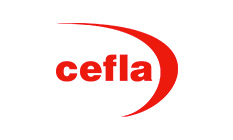
FOCUS ON
Predictive maintenance:
the Cefla-MIPU partnership.
by Laura Cenni
Cefla and MIPU recently signed an agreement to offer their customers cutting-edge solutions in the field of Artificial Intelligence, energy management and predictive maintenance.
This agreement aligns perfectly with the vision of Cefla, a key partner for integrated solutions concerning the design, construction and maintenance of technologically advanced systems.
One day, Henry Ford II – grandson of the more famous Henry Ford I, founder of the renowned car makers and the inventor of Fordism – was strolling through his company with Walter Reuther, head of the powerful auto workers’ union.
At a certain point Ford turned to Reuther and jokingly says, “Hey, Walter, how are you going to unionise these robots?” Reuther replies: “Hey, Henry, how are you going to get them to buy cars?”
In 1950 there was no talk of a ‘predictive factory’, that is, one in which people, machines and processes are connected online and where the thus-gathered data is systematically used to predict the phenomena of the near future in order to gain a competitive advantage.
Today the predictive factory is not only possible, it’s also the only viable way to achieve efficient, sustainable and inclusive production.
Whether we’re talking about manufacturing, industrial or energy plants, management has always sought to boost efficiency, starting with the enhancement of existing assets and, where possible, by taking a sustainability-based interconnection approach. Seeing work as a sequence of interconnected steps, similar to links in a chain, implies that an improvement to any one link will positively impact and optimise every other link in that chain.
The so-called ‘predictive factory’ thus has three underlying concepts: efficiency, because management of human resources, materials and financial resources can be optimised, sustainability, because pre-existing data is used to design new operating methods (self-improving AI), and inclusiveness, as diversity (age, vision, gender, ethnicity) and being open to new inputs can actually magnify the value of an existing process.
Artificial intelligence is revolutionising the areas in which we operate and the processes in which we’re involved.
The strength of the Cefla-MIPU partnership is rooted in a common background. It lies in the shared goals, experiences and skills of a major industrial group like ours – which, with over 90 years’ experience behind it, continues to develop solutions that improve well-being in the workplace and the home – and a dynamic enterprise like MIPU, which leads the way on the digital front; moreover, by leveraging a proprietary easy-to-integrate modular software platform, MIPU is bringing predictive models to factories and municipalities to reduce waste and costs, streamline management and enhance existing assets.
Predictive maintenance platforms, C-cogens and C-platform
Negli ultimi anni si parla molto di manutenzione predittiva approcci data-driven: le applicazioni di Machine Learning e Intelligenza Artificiale sono state presentate come la soluzione a tutti i problemi.
Non esiste però una politica manutentiva migliore delle altre: ogni azienda deve scegliere accuratamente il corretto mix al fine di definire la propria strategia.
Cefla, con MIPU, ha recentemente sviluppato due nuove piattaforme di manutenzione predittiva, C- cogenS e C-Platform, dedicate rispettivamente agli impianti di produzione di energia e agli impianti tecnologici in plant industriali.
In recent years there’s been a lot of discussion about data-driven predictive maintenance approaches: Machine Learning and Artificial Intelligence have been presented as the solution to all the problems.
However, no maintenance policy is necessarily better than others: every company needs to choose the correct mix with care in order to define its own strategy.
Cefla has, together with MIPU, recently developed two new predictive maintenance platforms, C-cogenS and C-Platform, respectively designed for power plants and technological systems in industrial facilities.
C-cogenS is an in-depth real-time monitoring system that Cefla provides to customers to monitor the global efficiency of power plants. As in the case of the Tor di Valle district heating plant built in Rome for the multi-utility company Acea, using a data source that’s updated in real time, IoT technologies and searchable dashboards allows assets to be monitored, ensuring energy efficiency and lower service costs. The system is also “Customer Oriented”, fully modular to adapt to any customer needs.
Building on this expertise, Cefla then proceeded with the development of C-Platform for all-round management of industrial buildings: like c-CogenS, it collects data in the field, integrates with existing BMS systems and can log data from all systems on a single cloud, displaying it on state-of-the-art dashboards and communicating with its own or the customer’s CMMS to integrate scheduled maintenance plans.


“The partnership with MIPU is a major step for us, and fits perfectly into a process that we started several years ago, which involves the development of increasingly integrated and digitised proposals in order to obtain valuable solutions for our customers and partners. The project we have in mind requires solid teamwork: this will allow us to fine-tune our skills and identify our customers’ actual needs in all areas in which we operate, whether this be production plants with our Cefla Tech, an area in which we’re investing heavily, technological systems or energy management systems. Energy management is a field in which we’ve strengthened our sector-specific skills in recent years – with increasingly specialised solutions for the design and construction of cogeneration power plants, biomass plants and plant engineering services.”
Massimo Milani, Managing Director of the Cefla Engineering Business Unit
“The path undertaken with Cefla is another, critically important step reminding us of how much MIPU has grown over the past 10 years… and how much remains to be done. We’re convinced we’ll have a significant impact on the sustainability and competitiveness of Italian industry and municipalities, an impact already measurable in the 160 customer companies that have chosen us and grow with us every day”.
Giulia Baccarin, CEO and Co-founder of MIPU


